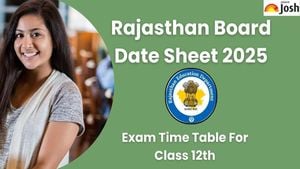Recent political developments have sparked significant reactions among India’s major political players, evidencing the intense dynamics following controversies involving influencers and electoral performances.
Following controversial remarks from podcaster Ranveer Allahbadia, known as ‘Beer Biceps,’ Congress MP Gaurav Gogoi has directed attention toward Prime Minister Narendra Modi’s endorsements. The backlash stems from Allahbadia's inappropriate question posed to a contestant on Samay Raina's show, ‘India’s Got Latent.’ His remark, which was phrased as, “Would you rather watch your parents have sex every day or join them to finish it once and for all?” elicited shock and criticism from his fellow judges during the show. Raina and others were taken aback, with Raina exclaiming, “What the f***?”
Gogoi, vocal on social media, urged PM Modi to be more judicious with his public endorsements. He stressed, “I hope PM Modi will look more closely at the people he has endorsed publicly and on social media... the Prime Minister of India must be expected to be more responsible.” Allahbadia had previously received high-profile recognition, including the 'Disruptor of the Year' award from Modi at the National Creators Award last year, making the criticism particularly pointed.
Adding to the political fallout, Maharashtra CM Devendra Fadnavis remarked on the importance of recognizing limits to freedom of expression. Meanwhile, Shiv Sena (UBT) MP Priyanka Chaturvedi indicated her intentions to raise the issue within Parliament, amplifying the controversy’s impact across party lines.
This debate is juxtaposed against the backdrop of the recent Delhi assembly elections, where analysis reveals shifting allegiances and electoral strategies. Observers have noted Congress's contribution to AAP’s decline, with Congress increasing its vote share from 4.26% to 6.36%, negatively impacting AAP’s stronghold on constituencies. Interestingly, AAP MLA Amanatullah Khan accused Congress of intentional sabotage to aid BJP’s win, claiming, “They knew they had no chance of winning but were determined to make us lose.”
The political atmosphere suggests Congress is no longer defensive about its role against AAP's dominance. Insights from party leaders indicate relief over AAP’s defeat, with sentiments from various Congress officials highlighting the newfound confidence to reclaim lost voter bases. One Congress leader emphasized, “Kejriwal had to go for Congress to grow... now Congress has to reclaim its votes.”
Echoing sentiments of independence, Mamata Banerjee of the Trinamool Congress (TMC) has announced plans for her party to contest the 2026 West Bengal elections without Congress, reflecting discontent with their collaboration, previously hindered by fluctuated strategies. Banerjee reinforced her stance by proclaiming, “We will come back with more than two-thirds majority... Congress has no stake here.”
The TMC leader’s remarks follow her observation about Congress and AAP’s failures to effectively support one another during recent elections, indicating the TMC’s intent to distance itself from Congress amid the shifting political narratives post-Delhi elections.
This scenario develops against the background of increased political tensions. For example, Congress's failure to establish solid alliances has provoked responses from various party leaders. BJP leader Suvendu Adhikari commented on Banerjee’s independence, calling her “clever” for maintaining distance from Congress, intent on consolidations of Hindu votes.
Overall, the political arena is progressively reorganizing itself with party leaders maneuvering their positions and alliances amid controversies and electoral shifts. The developments center around the need for responsible messaging from public figures and the tactical recalibration by established parties as they navigate public perception and their roles within the broader political spectrum.
The controversies surrounding public figures like Allahbadia highlight how personal actions can lead to broader political ramifications, prompting calls for accountability from leaders such as Modi and Gogoi. Similarly, the outcomes of the Delhi election expose vulnerabilities and opportunities for parties to refine their messaging and strategies going forward.



